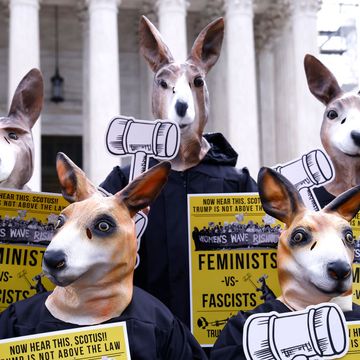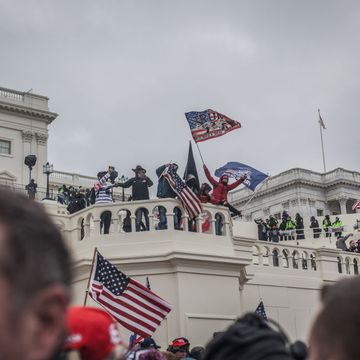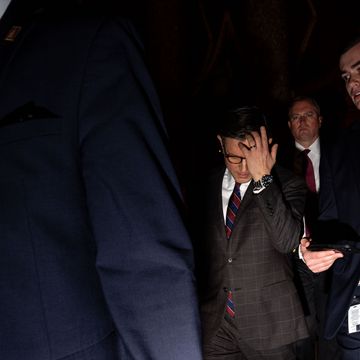Take him all in all, and Ben Bradlee was a giant, perhaps the last of them to preside over a newsroom in which people reported the news and wrote the news, rather than spending their time producing content over several platforms. Newspapers don't do larger than life any more. They don't do it in their pages. (Who's the new Royko? The new Lippmann?) They don't do it in their management suites, either. There is no room for giants in newspapers any more. They're too busy trying to survive, trying vainly to play catch up to a communications revolution that they never saw coming and that they lost almost before it began.
There will be some clucking from the precincts of the Internet whose mission seems more messianic than anything else, but there will be none of that here. Ben Bradlee was someone in a newspaper office that the country needed at a very dark time for democracy. He rode the Watergate story when nobody else wanted it. It's hard now even to imagine how very far out on the limb Bradlee went on that story. It was in the middle of a presidential election that was transforming itself -- or, as we came to discover, was being transformed -- into an historic rout. Richard Nixon was ending the Vietnam War right on his own selfish timetable, just in time to get himself re-elected. Nobody wanted to know what a venal horror the man really was. Nobody wanted to touch that story. Bradlee did, and he stood by his reporters because that's what you did when you were a newspaper editor in the days when newspapers had room for giants.
His legacy is not without its obvious flaws. He was far too close to John F. Kennedy for my comfort. He admitted to author Mark Hertsgaard that the Post ultimately took a dive on Iran-Contra, not because it wasn't a great story, a story perhaps bigger than Watergate in its fundamental constitutional implications, but because the national press didn't want to be seen as bringing down another popular Republican president, which is certainly not a consideration that ought to be relevant to a powerful newspaper's mission. The Janet Cooke episode, while it paled next to the baroque fabulisms of Jayson Blair and Stephen Glass that came later, was a staggering institutional failure that seems even now to be the result of pure hubris.
Not only was he the last of his kind professionally, but he also represented a vanished breed here in the Commonwealth (God save it!) -- the renegade WASP. He was a Crowninshield on his mother's side, related down through the tangled ages to Maximilian I. If you trace the demographic history of Boston, he was of the people who found their power usurped, and not always delicately, by the great waves of immigration that brought to America people like Patrick Kennedy of New Ross, and all those Fitzgeralds as well. He was of the generation that made the peace with what had happened, which brought him to the great friendship he had with Patrick Kennedy's grandson, who became president of the United States, a product of the new American Irish gentry that replaced all those Cabots and Lodges and Crowninshields behind the deep purple glass of the brownstones on Beacon Hill. He ordered wine in French and he swore like a longshoreman and he was not inauthentic for a second while doing either one of them. He was a giant, and there is no room for giants in the newsroom any more, because giants carry too much history with them, and history is no longer what it was. History is what came in over your BlackBerry 15 minutes ago.
There are still great editors. (Marty Baron at Bradlee's old newspaper is one of them. The courage Baron showed at the Boston Globe in pursuing the sex-abuse scandal in the Catholic Church was every bit the equal of the fortitude Bradlee demonstrated during Watergate when everyone who mattered was telling him to hit the silk.) But the dead hand of American corporate power has reached in and fashioned from what was a scruffy, noble craft a "business model" in which content-producers do what they can to improve and maintain "the brand." When distant historians write about America in the 21st century, they will write that it lost its soul somewhere between Silicon Valley and the Harvard Business School. That is, if there actually are historians in the distant future. Perhaps they'll all be too busy producing content to notice that, when the life of a country is rendered small, being larger-than-life is no great achievement, and that Ben Bradlee, take him all in all, was larger than life when that really meant something in a land built on the idea that there always is a new frontier, somewhere.

Charles P Pierce is the author of four books, most recently Idiot America, and has been a working journalist since 1976. He lives near Boston and has three children.












